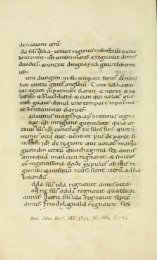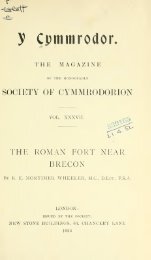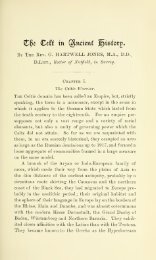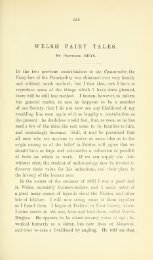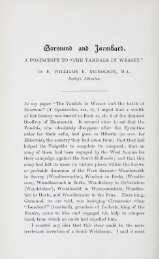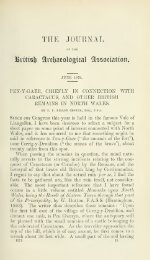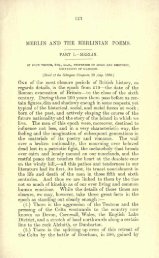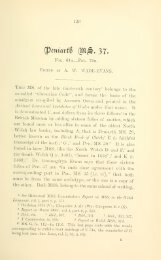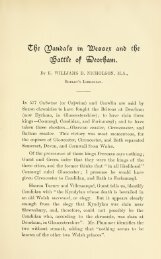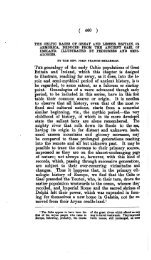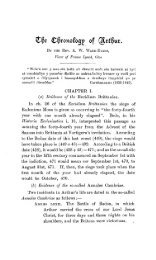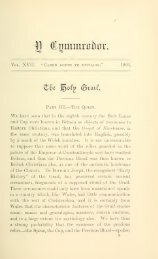An Introduction to Early Welsh - Arthur Pendragon of Wales
An Introduction to Early Welsh - Arthur Pendragon of Wales
An Introduction to Early Welsh - Arthur Pendragon of Wales
You also want an ePaper? Increase the reach of your titles
YUMPU automatically turns print PDFs into web optimized ePapers that Google loves.
3.] SOUNDS AND SOUND-CHANGES.<br />
Liquids. Voiceless:<br />
11, rh; voiced: 1, r.<br />
Semivowels :<br />
y, w.<br />
C,"K.'l^,4- . r%<br />
Sibilant : s.<br />
Breath : h.<br />
NOTE. The following are the more important orthographical<br />
variations :<br />
. W. c = k, both c and k found in Mid. W., c particularly at the<br />
end <strong>of</strong> a word ; e.g. O.W. cimadas fitting, Mid.W. kyvadas and cyvadas.<br />
In Mid.W. sc, sp became sg, sb, e.g. kysgu by kyscu <strong>to</strong> sleep, ysbryd<br />
from Lat. spiritus.<br />
(b) With regard <strong>to</strong> the graphic representation <strong>of</strong> the mediae the<br />
following may be noted. In Ola British the symbols c, t, p were taken<br />
over from Latin with their Latin values. In the course <strong>of</strong> time, before the<br />
loss <strong>of</strong> final syllables, c, t, p, when they s<strong>to</strong>od between vowels, or after a<br />
vowel and before certain consonants, became in sound mediae g, d, b, but<br />
continued in O. W. <strong>to</strong> be usually written c, t, p, e.g. trucarauc compassionate<br />
= Mid.W. trugarawc, Mod.W. trugarog, dacr tear= Mid.W. dagyr, atar<br />
birds = Mid.W. adar, datl gl. foro- Mid.W. dadyl, etn bird= Mid.W. edyn,<br />
cepistyr halter (from Lat. capistrum) = Mid.W. kebystyr. In Mid.W. g,<br />
d, b are regularly written in the interior <strong>of</strong> a word (except that c, t, p may<br />
appear in composition, e.g. rac-ynys fore-island, kyt-varchpgyon fellowhorsemen,<br />
hep-cor <strong>to</strong> dispense with, or in inflexion and derivation under the<br />
influence <strong>of</strong> the simple word, e.g. gwla<strong>to</strong>ed, by gwladoed countries: gwlat,<br />
gwaet-lyt bloody<br />
:<br />
gwaet). But final g is regularly expressed by c, and final<br />
d by t (except in certain MSS. such as BB. which express d regularly by d<br />
and use t <strong>to</strong> express the spirant d). Final p for b is not so universal; there<br />
are found, e.g. pawp, pop, everyone, every by pawb, pob, and mab son,<br />
heb said.<br />
rtcy The spirant f is in O.W. written f,<br />
and this survives in<br />
orthography<br />
Mid.\Y., but the usual Mid.W. symbol<br />
is ff or ph. In O.W. the tenuis is<br />
sometimes traditionally written for the spirant, e.g. cilcet gl. tapiseta<br />
(from Lat. = culcita) Mod.W. cylched.<br />
ft d) With regard <strong>to</strong> the graphic representation <strong>of</strong> the voiced spirants the<br />
following may be noted, g, d, b, m were taken from Latin with their<br />
Latin values. In time, between vowels and before and after certain<br />
consonants, they became spirants 3> d, v, but continued <strong>to</strong> be written g,<br />
d, b, m, e.g. scamnhegint gl. levant = later ysgavnheynt, colginn gl.<br />
aristam = Mod.W. colyn stiny, cimadas fitting<br />
- Mod. W. cyfaddas, abal<br />
apple = later aval. In O.W. the spirant g had already been lost in part, e.g.<br />
nertheint gl. armant by scamnhegint, tru wretched = Ir. truag wretched.<br />
In Mid.W. the spirant g has disappeared. The spirant d, which in<br />
Mod.W. is written dd, is in Mid.W. usually expressed by d, = e.g. rodi <strong>to</strong><br />
ffive Mod.W. rhoddi, except in certain MSS. such as BB. which use the<br />
symbol t, e.g. roti = rhoddi. The spirant v in Mid. W". is written u, uu, v,<br />
fu, f, the last particularly at the end <strong>of</strong> a word, (e.g. cyuadas, cyvadas,<br />
cyfuadas, cyfadasjtt/in^=O.W. cimadas, Mod.W. cyfaddas), in Mod.W.<br />
f ;<br />
in certain MSS., however, such as BB. it is expressed by w, e.g. calaw<br />
reeds = calaf. In O.W. final v has been already lost in part, e.g. lau hand<br />
= Ir..lam, and in the course <strong>of</strong> time it tends more and more <strong>to</strong> disappear,<br />
.e.g. in Mid.W. the superlative ending -af appears also as -a.



